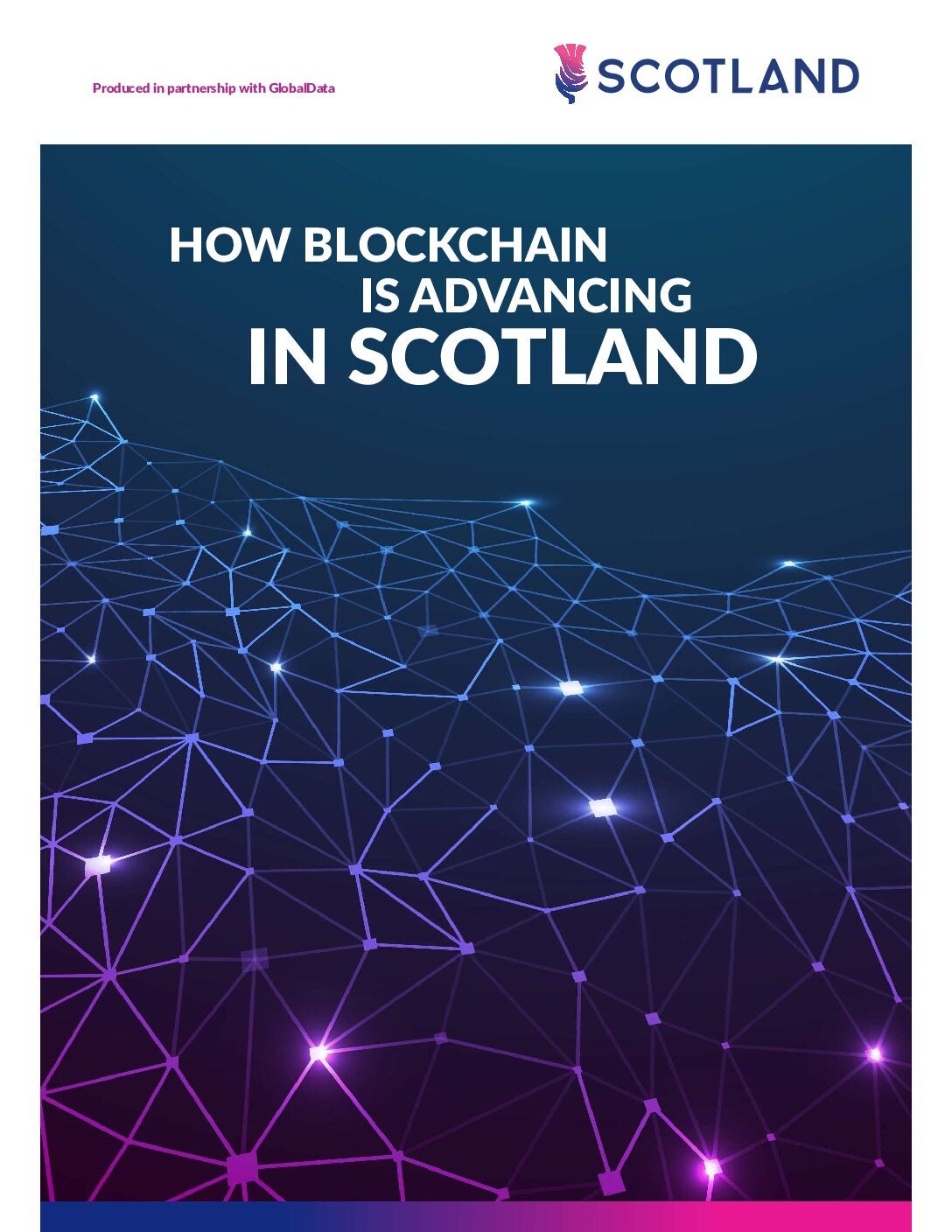
Blockchain has immense potential to become a reliable and secure platform for secure data storage and exchange, but public suspicion of the technology remains a key challenge to overcome.
The technology could have a significant impact across a range of sectors by providing a platform for secure and transparent data exchange. Uses in sectors include finance, manufacturing, energy, government, trade, customs, and healthcare.
Furthermore, there is rapidly growing value in the technology. The global blockchain software and services market is projected to be worth $291bn in 2030, according to GlobalData, with a compound annual growth rate (CAGR) of 55% from 2023.
To capitalise on this considerable international market, initiatives are underway in Scotland to capture the economic opportunity. By building trust in blockchain, there is an ambition to unlock a £4bn opportunity for Scotland.
Scotland’s Digital Trust Taskforce is implementing a roadmap for blockchain adoption, beginning by fostering positive awareness of the tech. Additionally, the Scottish Centre of Excellence for Digital Trust and Distributed Ledger Technology is accelerating commercial blockchain capabilities and strengthening partnerships between academic experts and the private sector.
Beyond crypto: The future for blockchain
Misconceptions surrounding illegal use of cryptocurrency and the NFT craze have overshadowed the huge commercial potential of the technology. Blockchain-based platforms could provide a single source of truth for record keeping and exchange.
Wider rollout of blockchain systems could transform data protection, visibility, and security. Data is usually shared informally over email or through system integrations. Whereas blockchain is tamper-proof, authentic, and resilient.
“Blockchain’s underlying cryptography has undeniably positive implications for the way we connect businesses and run our lives,” says Peter Ferry, chair of Scotland’s Blockchain and Digital Trust Taskforce.
“It feels like a contradiction, but the magic of cryptography is that it allows us to build these platforms that respect personal and business confidentiality while still demonstrating transparency so that people can trust that all parties are operating in the way that’s been agreed,” he adds.
The industries in Scotland set to benefit from blockchain
Blockchain-based platforms could have immense implications for a variety of industries beyond just financial services. Although finance remained the top global industry for blockchain uses in 2023 at 42%, the next best-performing sectors by revenue were transport and logistics at 17%, retail at 8%, 6% for healthcare, and government at 5%, according to GlobalData.
“It’s not just tech companies that are moving into this space,” says Ferry. “Blockchain is bringing about greater efficiency and improved systems in many areas that are strengths for the Scottish economy.”
ESG is one key area where blockchain can improve data transparency and accessibility. Through an immutable blockchain ledger, greenhouse gas emissions data can be verified, with visibility across the supply chain for Scope 3 emissions.
Siccar is one Scottish company in this field, offering a blockchain-based platform that results in a 95% reduction in fraud or error when reporting emissions, as well as an 80% reduction in manual data processing time. Software of this kind where data is visible will be essential in holding businesses accountable for setting ESG targets. Blockchain has much to offer the energy sector.
“I would really like to see blockchain adoption grow in the energy sector,” says Sarah Forbes, digital economy specialist at Scottish Enterprise. “Grid management and certification are vital areas where blockchain could be used, for example, in proving that the hydrogen you’re producing is actually green.”
As well as energy and ESG, blockchain platforms can improve transparency across Scotland’s thriving manufacturing supply chains.
“Platforms built on blockchain technologies have the ability not only to audit, but to do so in an automated way to build up a confident record of provenance, documenting how products have been built, and where they’ve been manufactured and assembled,” adds Ferry.
Using blockchain for digital identities and product passports
Alongside improving transparency across supply chains, blockchain can enhance the compliance and security of critical data. For example, authorities in Estonia have secured the medical data of 1.3 million people through its blockchain-based e-Health Record. Scotland has already taken steps to introduce digital identity in the public sector with the development of the ScotAccount since 2018. But developments in Europe with the EU Digital Identity Wallet are moving more quickly and promise streamlined public services and business contracts.
“Digital identity is the new tool that can help us fight this wave of identity theft and all the crime that’s connected to it,” says Ferry. “It will help people own the value of their data rather than handing it to some faceless corporation.”
Replacing paper documents with blockchain-based credentials is also emerging as a method for improving the efficiency of trade. In 2023, the UK’s Electronic Trade Documents Act asserted that certain digital documents have the same validity as their paper counterparts, a critical step in moving away from outdated paper-based methods.
“That act has been deemed ‘the bill that needs blockchain’,” notes Forbes. “That’s a really interesting area, the idea of digital product passports and end-to-end traceability.
“Technology needs to come forward that will help us respond to new regulations and requirements, but also enable companies in Scotland to have much cleaner, transparent end-to-end processes, and help them track their products from start to finish,” she adds. “Now there is a much greater expectation from consumers to have that understanding of where a product comes from.”
Support for blockchain in Scotland
The Scottish Centre of Excellence for Digital Trust and Distributed Ledger Technology aims to accelerate blockchain adoption across Scotland to unlock its benefits more quickly. Launched in January 2025, the centre is based at Edinburgh Napier University but operated in partnership with the Universities of Edinburgh and Glasgow, and FinTech Scotland, after successfully securing funding from Scottish Enterprise.
The centre hopes to find solutions to meet challenges affecting blockchain scale-up, foster greater trust in the technology, and advance the adoption of digital payments, assets, and identities. Working between academia, government, and the private sector, the centre aims to support startups and spin-outs, as well as partner with existing companies.
“Scotland didn’t come from nowhere on blockchain,” comments Ferry. “It has some real assets in this area, and if we can knit them together, we can make Scotland a real destination to do some of the best global work around digital trust technologies. But we’ve realised that no single startup or organisation could bring about the changes you need to get these technologies adopted. And that’s what led us to our education and adoption agenda.”
Scotland’s links to national and global financial services institutions, as well as its world-class universities for fintech, provide many advantages in blockchain development. Alongside pioneering academic research, Scotland’s universities continue to attract talent from across the UK and beyond, creating a significant skills base.
Monthly meetups between Blockchain Scotland members and the annual Block Start conference in Glasgow demonstrate the positive action for industry progress in Scotland. Under the direction of the Blockchain and Digital Trust Taskforce, Scotland has all the tools to expand its existing capabilities and realise the industry potential.
“There’s got to be a purpose to what we’re doing, and that’s why we call ourselves a task force,” explains Forbes. “We’ve got a roadmap of activity. We’re focusing on outcomes and deliverables. It’s not just another talking shop. We want to be action-focussed.”
Building on the Taskforce’s successes so far, Scottish Enterprise is now hosting an open innovation call to fund companies offering blockchain-based solutions within energy and manufacturing.
“We’re up and running with a lot of initiatives,” adds Ferry. “We are all incredibly excited about what the open calls are going to bring and their ability to provide real, informative case studies around the use of blockchain in industry.”
Listen to Peter Ferry and Sarah Forbes discuss this topic more in the podcast below:
To learn more about blockchain in Scotland, download the exclusive document below.



